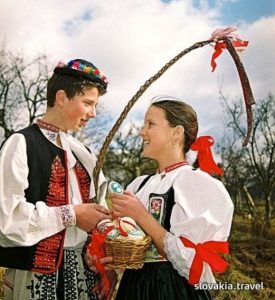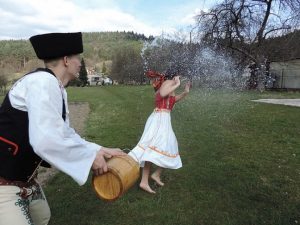Weird and Wonderful! Slovakia’s Easter Traditions
For Slovakia, which is a predominantly Catholic country, Easter is one of the most important annual festivals. But in addition to being a Christian holiday, Easter is also an opportunity to enjoy seasonal dishes – and for Slovaks to celebrate some rather unusual local traditions.
Good Friday is a national holiday in Slovakia, and a moment of quiet reflection for churchgoers. This time of symbolic rebirth and imminent plenty is a source of a charming seasonal tradition: painted eggshells, decorated with a wealth of regional patterns by Slovak craftspeople.
On Easter Sunday, traditional Easter foods are gathered in ‘blessing baskets’ comprising cooked eggs, bread, preserved meat, beetroot and horse-radish, along with dairy products like syrek (a cheese dish) and hrudka (a loaf made from eggs and milk), as well as paska sweetbread. These are taken to church and blessed by the priest.
For their main meal Slovaks, who tend to spend the Easter holiday at home, of course enjoy a range of traditional dishes – which we can arrange for you to enjoy as part of our gourmet tour.
Easter Monday, in contrast to the preceding calm, is not just a day for attending church in Slovakia. For young women, it’s that time of year when they can expect to encounter men bearing whips or buckets of cold water!
The tradition known as “šibačka”, which is more common in western Slovakia, involves young men using a ceremonial whip made from woven sprigs of fresh willow decoratively intertwined with ribbons to ‘beat’ – gently, it should be stressed! – their young female relatives and neighbors.
“Oblievačka”, by comparison, is more common in eastern Slovakia, and involves men dousing their female counterparts with cold water, or with perfume.
As you may have noticed, women seem to get the raw end of this deal. But it doesn’t end there: not only are women whipped or drenched, their male antagonists are encouraged to steal a kiss – and are typically rewarded with sweets or a shot of alcohol.
Both traditions are thought to hark back to the pre-Christian era, when soaking and/or whipping were supposed to ensure a woman’s beauty, health or fertility over the coming year. Water and willow are also seen as symbols of health and new life: so much so that girls in the country can even find themselves taking an unwanted dip in the village stream…
While all this sounds like the HR department’s idea of a horror show, it should be stressed that it is conducted in a light-hearted atmosphere. What is more, there is some redress: on Easter Tuesday the women are allowed to turn the tables and dispense cold water and kisses on the men.



